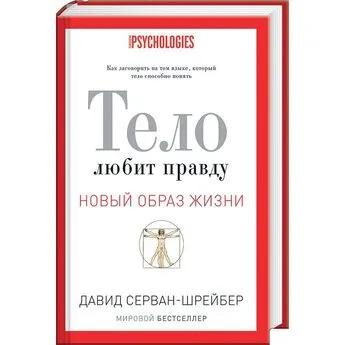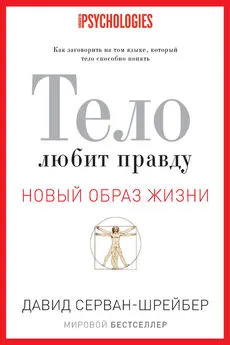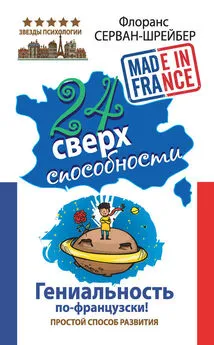Давид Серван-Шрейбер - Антирак. Новый образ жизни
- Название:Антирак. Новый образ жизни
- Автор:
- Жанр:
- Издательство:РИПОЛ классик
- Год:2010
- Город:Москва
- ISBN:978-5-386-02111-5
- Рейтинг:
- Избранное:Добавить в избранное
-
Отзывы:
-
Ваша оценка:
Давид Серван-Шрейбер - Антирак. Новый образ жизни краткое содержание
Антирак. Новый образ жизни - читать онлайн бесплатно ознакомительный отрывок
Интервал:
Закладка:
118. Pantuck, A. J., “Phase-II Study of Pomegranate Juice for Men with Prostate Cancer and Increasing PSA,” American Urological Association Annual Meeting, San Antonio, TX, 2005.
119. Manna, S. K., A. Mukhopadhyay, B. B. Aggarwal, “Resveratrol Suppresses TNF-Induced Activation of Nuclear Transcription Factors NF-[kappa]B, Activator Protein-1, and Apoptosis: Potential Role of Reactive Oxygen Intermediates and Lipid Peroxidation,” Journal of Immunology 164, no. 12 (2000): 6509-19.
120. Kaeberlein, M., T. McDonagh, B. Heltweg, et al., “Substrate-Specific Activation of Sirtuins by Resveratrol,” Journal of Biological Chemistry 280, no. 17 (2005): 17038-45.
121. Lappe, J. M., K. Travers-Gustafson, K. M. Davies, “Vitamin D and Calcium Supplementation Reduces Cancer Risk: Results of a Randomized Trial,” American Journal of Clinical Nutrition 85 (2007): 1586-91.
122. Woo, T. C. S., et al., “Pilot Study: Potential Role of Vitamin D (Cholecalciferol) in Patients with PSA Relapse After Definitive Therapy,” Nutrition & Cancer 51, no. 1 (2005): 32-36.
123. Cannell, J. J. and B. W. Hollis, “Use of Vitamin D in Clinical Practice,” Alternative Medicine Review 13 (2003).
124. Canadian Cancer Society, “La Société Canadienne du Cancer Annonce Ses Recommandations Concernant la Vitamine D,” 2007. (Accessed June 10, 2007, at www.cancer.ca.)
125. Chan, Holick, Leitzman, et al., “Diet After Diagnosis and the Risk of Prostate Cancer Progression, Recurrence, and Death.”
126. Gago-Dominguez, M., J. Yuan, C. Sun, et al., “Opposing Effects of Dietary n-3 and n-6 Fatty Acids on Mammary Carcinogenesis: The Singapore Chinese Health Study,” British Journal of Cancer 89, no. 9 (2003): 1686-92.
127. Goodstine, S. L., T. Zheng, T. R. Holford, et al., “Dietary (n-3)/(n-6) Fatty Acid Ratio: Possible Relationship to Premenopausal but Not Postmenopausal Breast Cancer Risk in U.S. Women,” Journal of Nutrition 133, no. 5 (2003): 1409-14.
128. Leitzmann, M., M. Stampfer, D. Michaud, et al., “Dietary Intake of n-3 and n-6 Fatty Acids and the Risk of Prostate Cancer,” American Journal of Clinical Nutrition 80 (2004): 204-16.
129. Hedelin, M., “Association of Frequent Consumption of Fatty Fish with Prostate Cancer Risk Is Modified by COX-2 Polymorphism,” Internation Journal of Cancer 120, no. 2 (2006): 398-405.
130. Norat, T., S. Bingham, P. Ferrari, et al., “Meat, Fish, and Colorectal Cancer Risk: The European Prospective Investigation into Cancer and Nutrition,” Journal of the National Cancer Institute 97, no. 12 (2005): 906-16.
131. Terry, P., A. Wolk, H. Vainio, et al., “Fatty Fish Consumption Lowers the Risk of Endometrial Cancer: A Nationwide Case-Control Study in Sweden,” Cancer Epidemiology, Biomarkers & Prevention 11, no. 1 (2002): 143-45.
132. Terry, P., P. Lichtenstein, M. Feychting, et al., “Fatty Fish Consumption and Risk of Prostate Cancer,” Lancet 357, no. 9270 (2001): 1764-66.
133. Hooper, L. T., R. Thompson, R. Harrison, et al., “Risks and Benefits of Omega 3 Fats for Mortality, Cardiovascular Disease, and Cancer: Systematic Review,” British Medical Journal 332 (2006): 752-60.
134. MacLean, C. H., S. J. Newberry, W. A. Mojica, et al., “Effects of Omega-3 Fatty Acids on Cancer Risk: A Systematic Review,” JAMA 295, no. 4 (2006): 403-15.
135. Norat, Bingham, Ferrari, et al., “Meat, Fish, and Colorectal Cancer Risk.”
136. George, S. L., et al., “Impact of Flaxseed Supplementation and Dietary Fat Restriction on Prostate Cancer Proliferation and Other Biomarkers: Results of a Phase II Randomized Controlled Trial (RCT) Using a Presurgical Model,” Journal of Clinical Oncology 63S (2007).
137. Bougnoux, P., et al., “Alpha-Linolenic Acid Content of Adipose Breast Tissue: A Host Determinant of the Risk of Early Metastasis in Breast Cancer,” British Journal of Cancer 70, no. 2 (1994): 330-34.
138. Wollowski, I., G. Rechkemmer, and B. L. Pool-Zobel, “Protective Role of Probiotics and Prebiotics in Colon Cancer,” American Journal of Clinical Nutrition 73, no. 2 (2001): 451S-55.
139. Kim, H. S., et al., “Dietary Supplementation of Probiotic Bacillus Polyfermenti cus, Bispan Strain, Modulates Natural Killer Cell and T Cell Subset Populations and Immunoglobulin G Levels in Human Subjects,” Journal of Medicinal Food 9, no. 3 (2006): 321-27.
140. Rayman, M. P., “The Importance of Selenium to Human Health,” Lancet 356, no. 9225 (2000): 233-41.
141. Kiremidjian-Schumacher, L., M. Roy, H. I. Wishe, “Supplementation with Selenium and Human Immune Cell Functions: II. Effect on Cytotoxic Lymphocytes and Natural Killer Cells,” Biological Trace Element Research 41, no. 1-2 (1994): 115-27.
Глава 9
1. Dolbeault, S., “Quantité de survie versus qualité de vie: quel impact des interventions psychothérapeutiques en oncologie? Le point en 2008,” Revue de presse d’oncologie clinique 17, no. 3 (2008).
2. Lerner, M., Choices in Healing: Integrating the Best of Conventional and Complementary Approaches to Cancer (Boston: MIT Press, 1994).
3. Simonton, C. O., S. Matthews-Simonton, and J. Creighton, Guérir Envers et Contre Tout (Paris: Desclée de Brouwer, 1990).
4. Baghurst, K. I., P. A. Baghurst, and S. J. Record, “Public Perceptions of the Role of Dietary and Other Environmental Factors in Cancer Causation or Prevention,” Journal of Epidemiology and Community Health 46 (1992): 120-26.
5. Antoni, M. H., S. K. Lutgendorf, S. W. Cole, et al., “The Influence of Bio-Behavioural Factors on Tumour Biology: Pathways and Mechanisms,” Nature Reviews Cancer 6, no. 3 (2006): 240-48.
6. Temoshok, L., “Biopsychosocial Studies on Cutaneous Malignant Melanoma: Psychosocial Factors Associated with Prognostic Indicators, Progression, Psychophysiology and Tumor-Host Response,” Social Science & Medicine 20, no. 8 (1985): 833-40.
7. Temoshok, L., “Personality, Coping Style, Emotion and Cancer: Towards an Integrative Model,” Cancer Surveys 6, no. 3 (1987): 545-67.
8. Simonton, et al., Guérir Envers et Contre Tout .
9. LeShan, L., Cancer as Turning Point (New York: Plume, 1990).
10. Gawler, I., You Can Conquer Cancer—Prevention and Treatment (South Yarra, Australia: Michelle Anderson, 2001).
11. Laplanche, J., and J. B. Pontalis, Vocabulaire de la Psychanalyse (Paris: Presses Universitaires de France, 1967).
12. Pace, T. T., T. Mletzko, O. Alagbe, et al., “Increased Stress-Induced Inflammatory Responses in Male Patients with Major Depression and Increased Early Life Stress,” American Journal of Psychiatry 163, no. 9 (2006): 1630-33.
13. Palesh, O., et al., “Stress History and Breast Cancer Recurrence ,” Journal of Psychosomatic Research 63, no. 3 (2007): 233-39.
14. Visintainer, M. A., J. R. Volpicelli, and M. E. P. Seligman. “Tumor Rejection in Rats After Inescapable or Escapable Shock,” Science 216 (1982): 437-39.
15. Ben-Eliyahu, S., et al., “Stress Increases Metastatic Spread of a Mammary Tumor in Rats: Evidence for Mediation by the Immune System,” Brain, Behavior, & Immunity 5, no. 2 (1991): 193-205.
16. Sapolsky, R. M., and T. M. Donnelly, “Vulnerability to Stress-Induced Tumor Growth Increases with Age in Rats: Role of Glucocorticoids,” Endocrinology 117, no. 2 (1985): 662-66.
17. Thaker, P. H., et al., “Chronic Stress Promotes Tumor Growth and Angiogenesis in a Mouse Model of Ovarian Carcinoma ,” Nature Medicine 12, no. 8 (2006): 939-44.
18. Visintainer, et al., “Tumor Rejection in Rats . . .”
19. Meares, A., “Regression of Osteogenic Sarcoma Metastases Associated with Intensive Meditation,” Medical Journal of Australia 2, no. 9 (1978): 433.
20. Spiegel, D., and J. R. Bloom. “Group Therapy and Hypnosis Reduce Metastatic Breast Carcinoma Pain,” Psychosomatic Medicine 45, no. 4 (1983): 333-39.
21. Spiegel, D., J. R. Bloom, and I. Yalom, “Group Support for Patients with Metastatic Cancer, a Randomized Outcome Study,” Archives of General Psychiatry 38, no. 5 (1981): 527-33.
22. Spiegel, D., et al., “Effect of Psychosocial Treatment on Survival of Patients with Metastatic Breast Cancer,” Lancet 2, no. 8673 (Nov. 18, 1989): 1209-10.
23. McCorkle, R., N. E. Strumpf, I. F. Nuamah, et al., “A Specialized Home Care Intervention Improves Survival Among Older Post-surgical Cancer Patients,” Journal of the American Geriatrics Society 48, no. 12 (2000): 1707-13.
24. Kuchler, T., D. Henne-Bruns, S. Rappat, et al., “Impact of Psychotherapeutic Support on Gastrointestinal Cancer Patients Undergoing Surgery: Survival Results of a Trial,” Hepato-Gastroenterology 46, no. 25 (1999): 322-35.
25. Richardson, J. L., D. R. Shelton, M. Krailo, et al., “The Effect of Compliance with Treatment on Survival Among Patients with Hematologic Malignancies,” Journal of Clinical Oncology 8, no. 2 (1990): 356-64.
26. Fawzy, F. I., A. L. Canada, and N. W. Fawzy, “Malignant Melanoma: Effects of a Brief, Structured Psychiatric Intervention on Survival and Recurrence at 10-Year Follow-Up,” Archives of General Psychiatry 60, no. 1 (2003): 100-103.
27. Linn, M. W., B. S. Linn, and R. Harris, “Effects of Counseling for Late Stage Cancer Patients,” Cancer 49, no. 5 (1982): 1048-55.
28. Goodwin, P. J., M. Leszcz, M. Ennis, et al., “The Effect of Group Psychosocial Support on Survival in Metastatic Breast Cancer,” New England Journal of Medicine 345, no. 24 (2001): 1719-26.
29. Edelman, S., J. Lemon, D. R. Bell, et al., “Effects of Group CBT on the Survival Time of Patients with Metastatic Breast Cancer,” Psycho-Oncology 8, no. 6 (1999): 474-81.
30. Ilnyckyj, A., J. Farber, M. Chang, et al., “A Randomized Controlled Trial of Psychotherapeutic Intervention in Cancer Patients,” Annals of the Royal College of Physicians and Surgeons of Canada 27 (1994): 93-96.
31. Cunningham, A. J., C. V. Edmonds, G. P. Jenkins, et al., “A Randomized Controlled Trial of the Effects of Group Psychological Therapy on Survival in Women with Metastatic Breast Cancer,” Psycho-Oncology 7, no. 6 (1998): 508-17.
32. Kissane, D. W., A. Love, A. Hatton, et al., “Effect of Cognitive-Existential Group Therapy on Survival in Early-Stage Breast Cancer,” Journal of Clinical Oncology 22, no. 21 (2004): 4255-60.
33. Spiegel, D., et al., “Effects of Supportive-Expressive Group Therapy on Survival of Patients with Metastatic Breast Cancer: A Randomized Prospective Trial,” Cancer 110, no. 5 (2007): 1130-38.
34. Everson, S. A., et al., “Hopelessness and Risk of Mortality and Incidence of Myocardial Infarction and Cancer,” Psychosomatic Medicine 58, no. 2 (1996): 113-121.
35. Chida, Y., et al., “Do Stress-Related Psychosocial Factors Contribute to Cancer Incidence and Survival?” Nature Clinical Practice Oncology 5, no. 8 (2008). Doi: 10.1038/ncponc1134.
36. Levy, S. M., R. B. Herberman, M. Lippman, et al., “Immunological and Psycho social Predictors of Disease Recurrence in Patients with Early-Stage Breast Cancer,” Behavioral Medicine 17, no. 2 (1991): 67-75.
37. Levy, S. M., R. B. Herberman, A. M. Maluish, et al., “Prognostic Risk Assessment in Primary Breast Cancer by Behavioral and Immunological Parameters,” Health Psychology 4, no. 2 (1985): 99-113.
Читать дальшеИнтервал:
Закладка:










